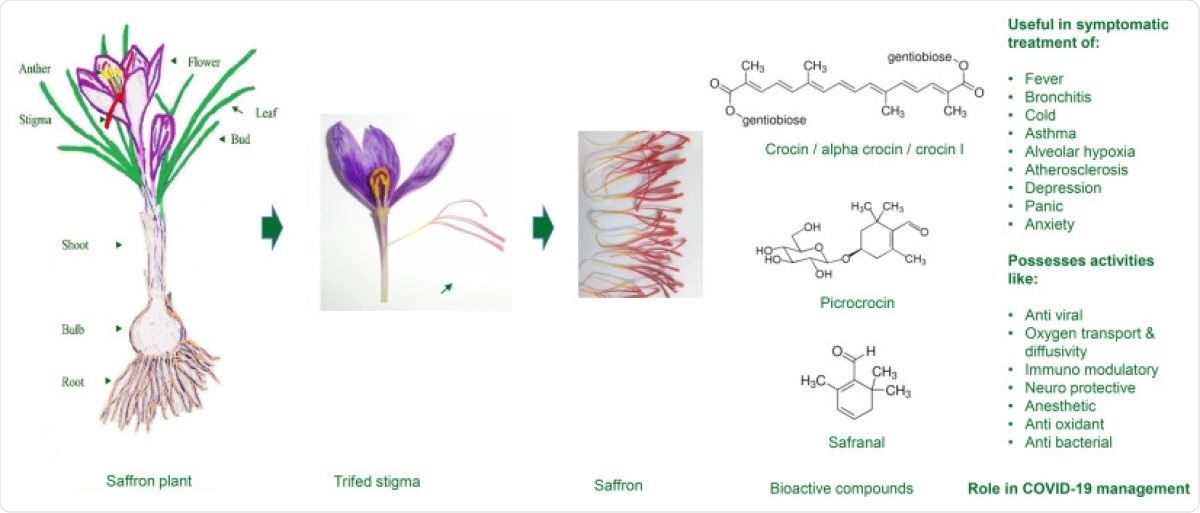The researchers – from the Kashmir University of Agricultural Sciences and Technology in India – recently published their findings in the journal Heliyon.
Significance of saffron
Saffron has been historically used to treat many ailments such as fever, bronchitis, the common cold, as well as other immune respiratory disorders. Saffron is also thought to alleviate symptoms of anxiety, depression, sleep disturbances and post-traumatic stress disorder. These abnormalities are associated with COVID-19, with 30-40% of patients believed to be affected by them. Due to its anti-depressive attributes, saffron may potentially assist those who are experiencing these symptoms, boosting their immunity as well as managing their mental wellbeing.
A large-scale analysis of almost 60,000 coronavirus survivors within 90 days after diagnosis, suggested a 5.8% chance of convalescents developing a new psychiatric illness. This necessitates a multi-disciplinary collaboration of physical and mental health care for acute coronavirus survivors.
Saffron compounds
The bioactive properties of saffron are due to the presence of volatile as well as non-volatile aroma-yielding compounds. The red stigmas of this spice accumulate different bioactive compounds including, safranal, crocin, campherol, picrocrocin, crocetin, α- and β-carotenes. These compounds are rare, with picrocrocin and crocin only being found in saffron and gardenia.
Due to its bioactive compounds, there have been a number of research papers focusing on cancer, antioxidant properties, neuronal injury as well as others. For example, saffron is considered to be an effective treatment for diseases such as coronary artery diseases and neurodegenerative disorders. In vivo studies have confirmed the antioxidant and anti-inflammatory role of ethanol or aqueous extracts of saffron, safranal, and crocin. Another study reported a reduction of blood bilirubin level and decreased blood cholesterol, and triglycerides were found after using crocetin and crocin.
The use of saffron extract as a nutraceutical includes but is not limited to anxiolytic effects, which were found in animal studies. The spice was also found to be as effective as donezepril for the treatment of Alzheimer's disease in a clinical trial. An animal model also found anti-inflammatory effects through the reduction of LPS-induced pro-inflammatory mediators.
Using saffron to manage COVID-19
The benefits of saffron within coronavirus infections could be to help with inflammation management. Due to saffron having an immune-boosting characteristic, it can help with early-stage infections, possibly working to ensure the patient has a more robust immune system which can help to reduce the severity of the viral infection. Its anti-inflammatory characteristic can also help with severe stages of infection management.
The immunomodulation of saffron components can help as a management strategy for COVID-19 through the direct targeting of toll-like receptors. A randomized clinical trial observed the immunomodulation characteristic of saffron; it found that the spice increased IgG antibody levels and decreased IgM antibody levels, compared to the baseline and placebo, which was also included. This could help manage coronavirus infection, as having a higher IgG antibody level could help protect against both bacterial and viral infections.

Saffron stigma bioactive compounds with therapeutic value useful for COVID-19 management.
Saffron can also help with the respiratory complications associated with COVID-19, due to its ability to inhibit the release of inflammatory cytokines and decrease coughing because of the anesthetic effect it can have on the vagal nerves of the alveoli. Crocetin, a compound of saffron, has been found to increase the speed of oxygen transport and diffusion in vitro and in vivo, which can be useful for COVID-19 as well as other conditions such as hemorrhages.
There is also an antiviral benefit to using saffron and saffron compounds. Crocin and picrocrocin were found to show significant antiviral effects, effectively inhibiting viral entry and replication. These compounds were found to be promising antiviral herbal therapies against viral infections, such as for the herpes simplex virus and HIV.
Because 21% of COVID-19 trials on management have been targeted towards non-vaccine approaches, such as through immunomodulatory strategies and dietary supplementation, saffron is also a good option to be included in this. Saffron consists of vitamins B and C, carotenoids and phytochemicals, which help bolster the immune system.
The compounds of this spice have been used in several polyherbal drug formulations, which can treat several different types of conditions, including depression, with clinical trials showing its efficacy in Alzheimer's and depression with the intake of 20-200 mg/day for 10 days to several weeks. The most effective and common dosages include 30-50 mg/day, and high doses such as more than 5 g/day can be toxic and even produce adverse side effects.
Having saffron and saffron compounds as a potential additional drug for coronavirus management could produce significant benefits, from its anti-inflammatory and immunity-boosting properties to its ability to help with the mental wellbeing of patients who may be vulnerable to developing new psychiatric illnesses.
Source:
Journal reference: